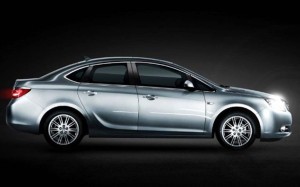After long stretch of year-over-year sales increases that continued even as the Chinese economy began to show signs of slowing down, General Motors and its joint ventures in China reported a 0.4% drop in sales during April.
Domestic sales by SAIC-GM-Wuling were up 10.2% year on year to 139,041 units. But sales by Shanghai GM, GM’s other major venture, dropped 6.7% to 119,032 units.
GM offered no comment on the sales decline last month, which came amid signs that the rapid growth of the global auto industry is beginning to slow as China grapples with complex economic and environmental challenges. In addition, starting with April’s results, GM is reporting retail deliveries rather than wholesales in China.
Buick sales in the domestic market decreased 8.5% on an annual basis in April to 63,307 units. Shanghai GM’s most popular brand was led by the Excelle XT and GT, which had sales of 14,421 units. Demand for Buick’s trio of SUVs – the Envision, the Enclave and the Encore – increased 134.3%.
Chevrolet sales in China dropped 5.6% on an annual basis. Its most popular nameplate in April was the Cruze, followed by the Sail and the Malibu.
(GM expects to fall short of 2017 EV goal of 500,000 on the road. For more, Click Here.)
Cadillac luxury vehicle sales in China were up 4.6% year over year. Sales of the ATS-L and ATS totaled 2,364 units. They were followed by the SRX and the XTS. Cadillac sales are expected to get another bump later this year when GM opens a new plant in Shanghai, specifically dedicated to building Cadillac models specifically for Chinese customers.
(Click Here for details the latest Automotive Hall of Fame inductees.)
At the other end of the price ladder, sales of the modestly priced models from Baojun, the brand China-specific brand GM created to sell less expensive vehicle, jumped 365.8% in April. Sales of its most popular model, the Baojun 730 multi-purpose vehicle accounted for about 88% of that demand.
(To see more about GM’s Mary Barra defending the maker’s use of capital, Click Here.)
Wuling sales across China decreased 5.1% from April 2014 to 114,740 units. The brand was once again led by the Hong Guang family, which had sales growth of 3.2% to 53,568 units.

